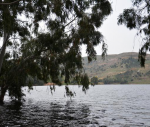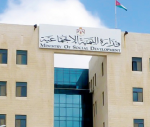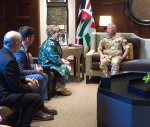You are here
Decentralisation leads to development
Sep 13,2014 - Last updated at Sep 13,2014
Decentralisation is a foundation stone in the process of reform and development. It creates a wider platform for participation in the decision-making process and works to bridge the gap between policy makers and the community.
Decentralisation is based on comprehensive structures that include development strategies centred on a participatory approach; the needs of citizens within achievable, objective priorities; and groundwork that combines capabilities and aspirations.
His Majesty King Abdullah said: “When I began to visit the provinces it seemed to me that the citizen is one who knows the priorities for his district.”
It is assumed that decentralisation only works in stable and safe societies that adopt a democratic approach.
In the field of administrative development, decentralisation normally reduces bureaucracy, reinforces transparency, emphasises the importance of individual responsibility, and stresses efficiency, creativity and innovation.
In the social sphere, decentralisation helps limit the migration towards the capital, and enhances creativity and competitiveness among geographical regions, which strengthens social values.
It also limits unemployment and pockets of poverty, and creates investment opportunities in the regions.
Devolving authority to governorates makes access to services easier and more targeted, as they will be tailored according to the priorities and needs of the citizens, based on comprehensive scientific field surveys.
To achieve decentralisation there is need of a participatory framework that includes all provinces whose input has to be taken into account when preparing the decentralisation law, especially knowing that municipalities’ ability to deliver services was seriously hindered by financial problems and sagging administrations.
Municipalities need effective solutions to remove all obstacles that prevent them from playing their role. Therefore, it was essential to establish a municipalities law that gives more authority to local councils.
In order to overcome the social and economic repercussions of the political situation in the region, it is necessary to draw up modern policies and use contemporary approaches that adapt to the developments, take into account the needs, aspirations, abilities and capabilities of the people in the different geographical regions and involve effective popular participation.
Building on achievements, there is need to ensure that all citizens contribute to development in a democratic manner.
Strengthening pluralism to ensure that each citizen contributes to the building on the future, Jordan will become a model of citizenship and good governance.
Reform and modernisation require move towards local governance, and new laws on decentralisation and municipalities.
Municipal work is expected to rely upon comprehensive studies and field surveys to invest in capacities in accordance with objective plans and studies within each area and at all levels.
Citizen participation strengthens the case of administrative reform.
Any action aiming at decentralisation should endeavour to: delineate the administrative boundaries of the province and the development boundaries of the local administration; draw up plans needed to highlight the appropriate developmental framework; give incentives for investment and bring about a qualitative partnership between the private sector and municipalities; include professional associations and sports clubs in the decision-making process; invest in a municipal fund; give renewable energy projects a leading role in developing municipalities and find the necessary facilities to do so; give due consideration to the role of youth in municipal development work, enable their participation in decision making and benefiting from their ideas; create an administrative structure and give job description to municipal councils; and highlight the role of national and cultural content in service development.
The writer is chairperson of the Foreign Affairs Committee in the Jordan House of Representatives. He contributed this article to The Jordan Times.











